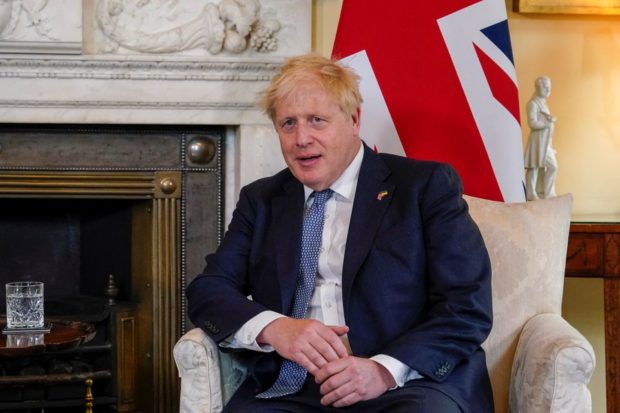Replacing a UK prime minister without general election

British Prime Minister Boris Johnson meets with his Estonian counterpart at 10 Downing Street, London, Britain June 6, 2022. Alberto Pezzali/Pool via REUTERS
LONDON — Replacing a prime minister mid-term is far from unusual in Britain and the incumbent’s party is under no obligation to call a general election.
In fact, the last prime minister to be voted both in and out at the ballot box by the public was Tory leader Edward Heath, way back in 1974.
Harold Wilson (1974-1976)
Labor party leader Wilson became prime minister for the second time in February 1974, succeeding Heath as head of a minority government.
He won a three-seat majority at a second election in October the same year.
He oversaw a referendum on Britain’s continued membership of the European Community, the forerunner to the European Union, until his surprise resignation.
Article continues after this advertisementJames Callaghan (1976-1979)
Wilson’s foreign secretary won the resulting Labour leadership contest.
Article continues after this advertisementBut industrial unrest and economic woes that dominated the 1970s dogged his time in office.
He was criticized for apparently downplaying it and was defeated by the Tories in the 1979 general election.
Margaret Thatcher (1979-1990)
Thatcher became a Tory icon for breaking the power of the trades unions and implementing her free market policies, winning the 1982 Falklands War and three general election victories.
Her steely reputation at home and abroad earned her the nickname the Iron Lady.
But public opposition to a taxation policy and ideological differences with colleagues about her attitude to Europe soured her time.
Thatcher stepped down as she faced a leadership challenge from senior ministers.
John Major (1990-1997)
Thatcher’s finance minister replaced her in the ensuing internal contest and won his own mandate at the ballot box two years later.
But his premiership was beset by a series of sleaze scandals involving senior colleagues, doubts about his stewardship of the economy and growing concern about further European integration.
Tony Blair (1997-2007)
Blair capitalized on disaffection with the Tories to win a landslide victory in 1997.
He was Labor’s most successful prime minister, winning elections twice more in 2001 and 2005, and becoming a recognizable global figure.
He rode a wave of optimism in his first years in office but his time at Downing Street was derailed by a loss of trust after the Iraq War.
He stepped down mid-way through his third term under pressure from supporters of his finance minister Gordon Brown to honor a supposed deal to hand over power.
Gordon Brown (2007-2010)
The brooding chancellor of the exchequer won the resulting Labour leadership contest, although the outcome was never in doubt.
But his premiership was cut short by the 2008 global financial crash and its aftermath, as well as his awkward style that failed to convince voters.
David Cameron (2010-2016)
Cameron initially ruled as senior partner in a coalition government with the smaller Liberal Democrats after the 2010 election until he won the Tories an outright majority in 2015.
He sought to quell Tory MPs’ disquiet about Europe by calling a referendum on continued membership and campaigned to stay in the bloc.
But the gamble failed and he quit after losing the vote in 2016.
Theresa May (2016-2019)
May was appointed unopposed by the party but the former interior minister’s time in power was hit by fierce factional fighting about the shape of Brexit.
She won a general election in 2017 but stepped down after repeatedly failing to get her EU divorce deal through parliament.
Boris Johnson (2019-2022)
The Brexit figurehead won the ensuing leadership contest and cemented his position with a landslide election win in December 2019, taking Britain out of the EU.
But his plans to address regional inequality were upended by Covid and a series of scandals.
One scandal too many lost him the support of senior ministerial colleagues and he resigned in July 2022, triggering the third Tory leadership campaign in six years.
RELATED STORIES
Boris Johnson’s relaxing summer
Truss tipped to prevail as UK leadership race nears end
Liz Truss 22 points ahead in race to be Britain’s next PM—poll
Trailing UK leadership candidate Sunak says contest is in ‘early days’